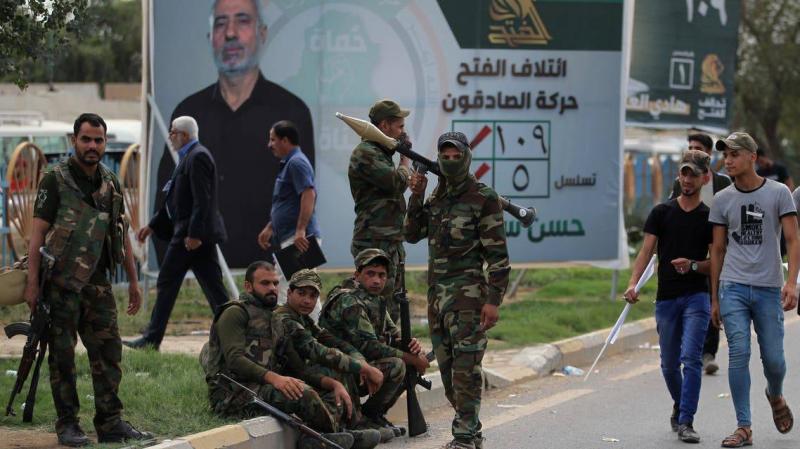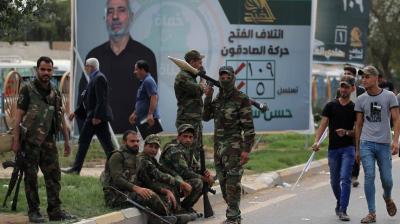In recent years, the Popular Mobilization Forces (PMF) have transformed into a central player in Iraq that cannot be overlooked, according to experts. They hold the second-largest parliamentary bloc, can manage billions of dollars, possess a massive military force supported by Iran, and have once again demonstrated their control over the political landscape of the country. The election of the hardliner Ebrahim Raisi as President of Iran may provide a further boost to the PMF. A leading figure in the PMF, Abu Alaa al-Walaei, regarded Raisi’s victory as a "congratulation to the resistance approach and a defeat for normalization and humiliation."
As evidence of their growing influence, the PMF recently succeeded in obtaining the release of their leader Qassem Muslih, who was accused of being involved in the assassination of activists after the judiciary stated that there was insufficient evidence to convict him, disappointing democracy-supporting activists. Researcher Reinad Mansour from the Chatham House research center told AFP that the PMF, a coalition of Iran-aligned armed factions established in June 2014 and integrated into regular forces in November 2016, "is not an anomaly but a measure of the behavior of authority in Iraq." He explains that "the PMF's goals are the same as the goals of all political parties in Iraq, which is to become the primary political force in a system that allows, in the absence of true rule of law, access to power without being accountable to the people or institutions."
Deep Connections
Mansour believes that the release of Qassem Muslih two weeks after his arrest on suspicion of involvement in assassinations "demonstrates the depth of the PMF's connections within the state, so much so that their connections exceed those of Prime Minister Mustafa al-Kadhimi, who presents himself as a defender of the 'October Revolution' activists but has yet to hold their killers accountable." Muslih was arrested on May 26 on suspicion of assassinating activist Ihab al-Wazni, the head of the protests coordination in Karbala, who had been warning for years about the dangers of the dominance of Iran-aligned armed factions, and was killed by gunmen in front of his home. He was also accused of assassinating another activist, Fahem al-Taee, also from Karbala.
According to a senior Iraqi official who spoke to AFP, PMF elements are present in all facets of security forces, to the extent that they "no longer fear" these forces. The official, who requested anonymity due to the sensitivity of the matter, added that "the armed factions affiliated with the PMF are working to dismantle what remains of the army to weaken and fragment it," although "there are still a few loyal leaders who try to withstand these attempts."
As a result, the PMF's previously grassroots support, which placed it second in parliament after it formed its first electoral list in the 2018 legislative elections, is no longer its pathway to power and influence. Political sources within the PMF estimate that its results in the upcoming elections scheduled for October will be worse than the last time. This electoral event comes after the "October Revolution" of 2019, when hundreds of thousands of Iraqis protested for months against the system, with demonstrators accusing the factions within the PMF of being responsible for the assassinations of activists involved in the protest movement and for the bloody crackdown that claimed 600 lives.
The PMF was integrated into state institutions amid the need for it during the battles against the Islamic State, despite opposition from Kurdish and Sunni legislators. Amid all this, political parties sharing power in state institutions and governance are trying to maintain their influence, agreeing, according to Mansour, on a "prime minister who is a compromise solution, capable of being the face of reform but actually hiding behind a corrupt political system," allowing themselves some maneuvering space.
While corruption permeates all state institutions and parties, some parties also retain weapons. The PMF, which possesses a large military arsenal, also operates through parallel armed groups under ambiguous names, allowing it to strike specific targets without risking being held accountable for it, such as targeting American interests, for instance. PMF leaders generally welcome the firing of rockets and drones against American targets in Iraq but do not claim responsibility for them.
Rivalries
Groups from the PMF control border crossings and port docks in Iraq through corruption and bribery that fill their coffers with funds they do not need to pay their members' salaries, as they are integrated into official forces and receive their salaries from the state. Experts say that bribery and extortion dollars may ultimately benefit multiple parties, especially Iran, which is subject to U.S. sanctions, and its regional allies like Hezbollah in Lebanon. For instance, a senior Iraqi banking official recounts that "politicians and militia men have been transferring cash amounts for 18 years by plane to Lebanon," noting that "60 billion dollars have been sent to Lebanon."
Ironically, the only party capable of being a real competitor to the PMF factions is Muqtada al-Sadr, the former militia leader, according to an Iraqi official who spoke to AFP. He adds that al-Sadr, with his financial and military capabilities, presents a "thorn in the side" of the Iran-aligned factions, which are trying to create a model akin to the Iranian Revolutionary Guard in Iraq. This rivalry, as confirmed by experts and officials, is the only deterrent preventing the factions from transforming into a completely similar version of the Iranian Revolutionary Guard.




